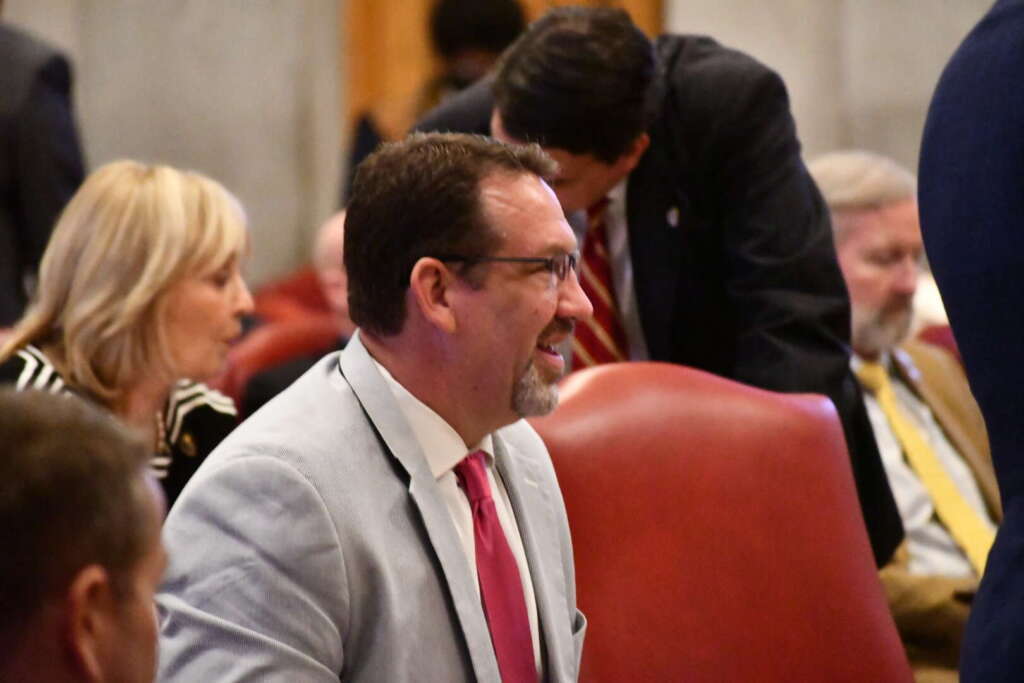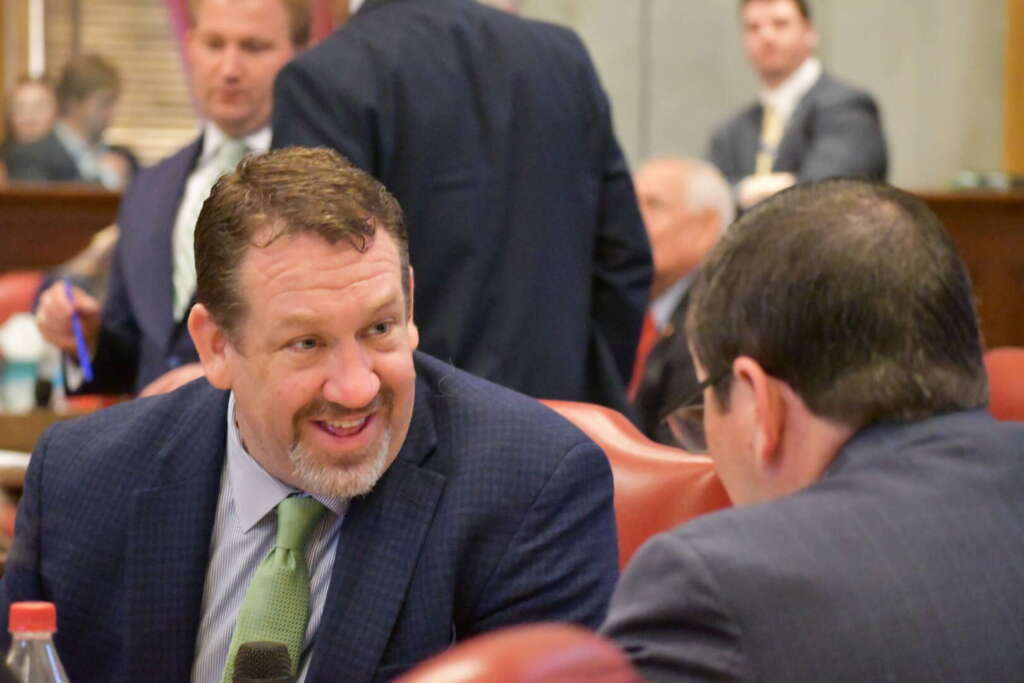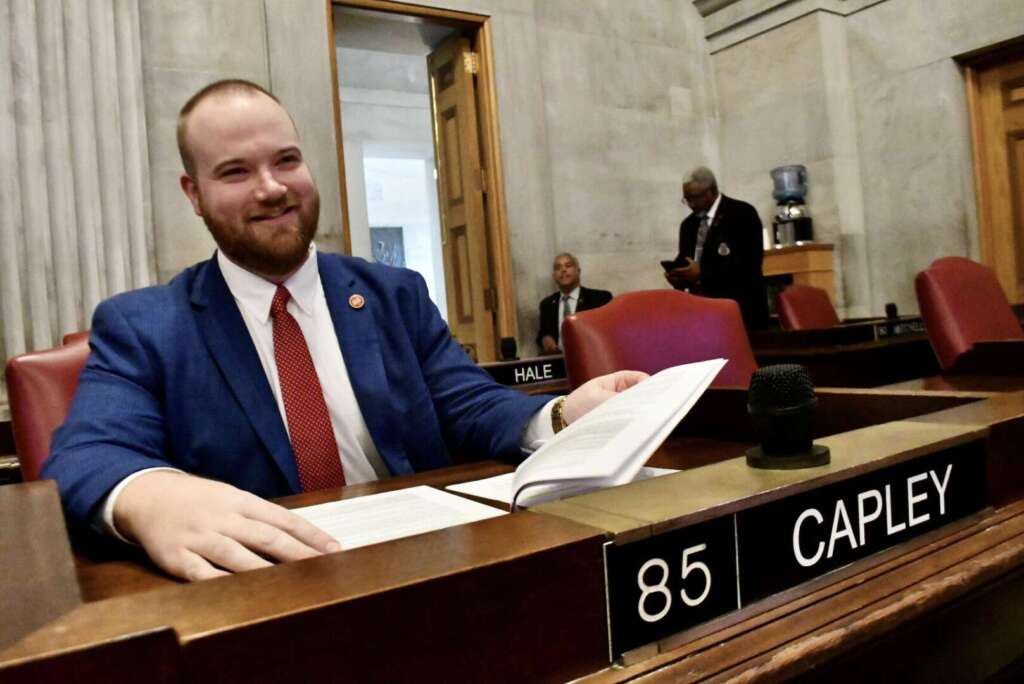This week was busy, but I felt so encouraged by the work being done by my colleagues to improve the already great state of Tennessee. Wednesday was bittersweet, as we honored friends who are retiring from the legislature. These representatives, both Republican and Democrat, have made substantial impacts on my life that I will not soon forget. Politics aside, these are people I have broken bread with, confided in, and laughed with during our time together. They are friends who I know will continue to be a support system for me even after they leave.
Speaking of dear friends, I had the honor and privilege of honoring the legendary Joe Gregory on the floor this week. Joe has worked for WKRN News 2 for years, and his commitment to the truth and journalistic expertise is exceptionally rare. He has truly lived out his God-given calling with his career and is now answering the well-deserved call of retirement. It has been such a joy to form a friendship with Joe over the years, and it is people like him who keep me motivated to serve the state of Tennessee.



Constitutional amendment gives judges more discretion for bail
A proposed amendment to the Tennessee Constitution that would increase public safety by allowing bail to be denied for more violent crimes advanced out of the House Finance, Ways and Means Subcommittee this week.
House Joint Resolution 859, filed by House Speaker Cameron Sexton, R-Crossville, would expand a judge’s ability to deny bail for certain violent crimes, including terrorism, second-degree murder, aggravated rape, and grave torture. Current law limits judges’ ability to deny bail to first-degree murder charges.
“Expanding the option for a judge to deny bail for violent offenders helps ensure the safety of all Tennesseans,” said State Rep. Kip Capley, R-Summertown, who is guiding passage of the legislation. “By keeping individuals charged with violent crimes in custody, there is a reduced risk of them posing a threat to all Tennesseans.”

The proposed amendment would also increase judicial transparency by requiring a judge or magistrate to explain their reasons for allowing or denying bail for a defendant.
The Tennessee General Assembly in 2022 passed truth in sentencing reform, which requires offenders convicted in eight categories of violent crimes to serve 100 percent of their court-imposed sentences before their release. That same year, murders declined 14.6 percent statewide while rapes declined 10.6 percent and kidnappings fell nearly 12 percent when compared to 2021, according to the TBI.
House Joint Resolution 859 will now go to the Finance, Ways and Means Committee for further consideration. Any proposed amendment to the Tennessee Constitution must first be approved by two separate General Assemblies before it can be placed on the ballot for voters to decide.
Republicans protect financial aid eligibility for nursing students
The Tennessee House of Representatives this week unanimously passed legislation ensuring students in licensed practical nursing (LPN) programs can still qualify for federal financial aid assistance.
House Bill 2378, sponsored by State Rep. Esther Helton-Haynes, R-East Ridge, requires the Tennessee Board of Nursing to set a minimum of 1,296 clock hours, or an equivalent number of credit hours, for practical nursing programs offered at public institutions of higher education in the state. A minimum of 980 hours is currently required.

Beginning July 1, colleges that offer LPN programs longer than the minimum set by state law or regulatory board will no longer qualify for federal financial aid. House Bill 2378 will ensure students enrolled in the Tennessee Board of Regents’ (TBR) LPN programs, which exceed the current state minimum requirement, remain eligible to receive financial assistance.
“It is essential that Tennesseans have opportunities to pursue a career in health care here at home,” Helton-Haynes said. “This legislation will ensure students can continue to afford to attend one of the many LPN programs offered across our state. This will not only benefit them professionally, but it will improve overall health care in Tennessee.”
Private institutions would still be able to maintain their current curriculum lengths in accordance with the Board of Nursing’s rules, according to the legislation.
The Tennessee College of Applied Technology (TCAT), operated by the TBR, is the single largest provider of LPNs in the state. During the 2022-23 academic year, 1,186 new LPNs graduated statewide.
Tennessee faced a shortfall of 15,700 registered nurses in 2021, according to a report from the Tennessee Hospital Association. The shortage is expected to lead to increased demand for LPNs statewide.
House Bill 2378 was unanimously approved by the House chamber on April 8. The companion version of the legislation is still advancing in the Senate.
Grant program helps solve violent crimes
Legislation offering additional support to solve more violent crimes in Tennessee advanced out of the Criminal Justice Committee this week.

The Tennessee Violent Incident Clearance and Technological Investigative Methods Support Act (TN-VICTIMS), sponsored by State Rep. Lowell Russell, R-Vonore, would provide grants to law enforcement agencies to fund strategies and initiatives aimed at improving violent crime clearance rates and supporting victims statewide.
“Keeping Tennesseans safe remains a top priority for Republicans in the General Assembly,” Russell said. “The TN-VICTIMS Act will provide valuable assistance to law enforcement agencies across our state to ensure violent criminals are quickly brought to justice. This will improve public safety and provide victims with the support they deserve.”
The grant program would be developed by the Department of Finance and Administration’s Office of Criminal Justice Programs, in consultation with the Tennessee Peace Officer Standards and Training (POST) Commission, the Tennessee Law Enforcement Training Academy and the Tennessee Bureau of Investigation (TBI). All law enforcement agencies in Tennessee would be eligible to receive funding.
According to the most recent TBI data, 502,189 crimes were reported statewide in 2022. Of those cases, 179,960, or 35.8 percent, resulted in arrests.
House Bill 2794 is scheduled to be heard in the Finance, Ways and Means Subcommittee on April 16.
General Assembly votes to expedite evidence collection in DUI cases
The General Assembly this week passed legislation allowing for faster and more effective collection of blood samples involving individuals suspected of driving under the influence in Tennessee.
House Bill 2386, sponsored by State Rep. Ron Gant, R-Piperton, allows an officer to execute a search warrant anywhere in the state for medical records or test to determine the alcohol or drug content of a person’s blood. The legislation also gives magistrates increased authority to issue warrants to recover evidence if at least one element of the crime occurred within their jurisdiction.
“Because evidence of alcohol and drugs metabolizes and dissipates from the bloodstream quickly, this bill… will provide for a timely or more efficient collection of blood evidence to support the effective prosecution of DUI, vehicular assault, and vehicular homicide offenses,” Gant said Monday.
Additionally, the bill encourages hospitals and health care providers to take a blood sample as soon as possible when a warrant is issued. The sample should also be provided to law enforcement expeditiously.
There were 7,774 wrecks in Tennessee that involved impaired drivers in 2022, according to the most recent data from the Tennessee Department of Safety and Homeland Security. There were 575 fatalities and 4,964 injuries as a result.
House Bill 2386 will now head to Gov. Bill Lee’s desk to be signed into law.
House passes massive franchise tax cut, adds transparency disclosure
The House chamber this week passed legislation cutting $400 million in taxes by simplifying Tennessee’s franchise tax on a business’ net worth.

House Bill 1893, sponsored by House Majority Leader William Lamberth, R-Portland, removes the property measure from the state’s franchise tax calculations and authorizes the Department of Revenue to issue refunds to taxpayers who have paid the tax based on property located in the state.
“We have businesses moving from all over the country and all over the world to Tennessee because of our low tax structure,” Lamberth said. “The primary goal of this is to keep that strong business community here so that every hardworking Tennessean not only has a job, but has multiple jobs to pick from and can be competitive for those jobs and get higher wages.”
An amendment added to the House version of the bill requires any refunds to be made public. It also allows companies who wish to stay under the current tax structure for the tax period ending before Dec. 31, 2023 to do so. If a business applying for a refund has also received economic credits or incentives from the Tennessee Department of Economic and Community Development, the credit amount would be applied to the refund first.
The Senate previously approved the legislation but declined to adopt the House amendment. A conference committee will be appointed to work out the differences between the bills in both chambers.
General Assembly expands newborn Safe Haven program
The General Assembly recently approved legislation expanding Tennessee’s newborn Safe Haven program.
House Bill 1922, sponsored by State Rep. Ed Butler, R-Rickman, adds participating emergency communications centers and nursing homes in counties without hospitals to the list of approved locations for safe haven baby boxes and drop-off locations.
“This is an important step in ensuring rural communities have access to newborn safe haven boxes,” Butler said. “This program allows suffering mothers to safely surrender their child in a place where proper care can be given. Tennessee is a pro-life state and I encourage mothers to take the necessary steps to keep their children, born and unborn, safe and healthy in times of crisis. I thank my colleagues for supporting this life-saving legislation.”
House Bill 1922 would ensure emergency communications centers and nursing homes are subject to the same policies other facilities are bound by under Tennessee’s Safe Haven law.
Tennessee currently has three Safe Haven baby boxes, located at fire stations in Jackson, Knoxville, and Kingston. Baby boxes allow mothers to securely and anonymously surrender their child in a continuously monitored safety device that allows medical staff members to care for the baby quickly.
Current law allows mothers to surrender their newborn up to 14 days after birth without fear of prosecution at hospitals, birthing centers, community health clinics, walk-in clinics, EMS facilities, and 24-hour fire and law enforcement facilities.
More than 130 newborn babies have been safely surrendered in the state since the Safe Haven law was enacted in 2001, according to Secret Safe Place for Newborns of Tennessee. House Bill 1922 now heads to Gov. Bill Lee’s desk to be signed into law.
Wheelchair repair bill advances in the House
Legislation aimed at speeding up the repair process for Tennesseans who use wheelchairs advanced out of the Commerce Committee this week.
House Bill 2147, sponsored by State Rep. Michael Hale, R-Smithville, allows for simple, non-clinical repairs to be made independently without voiding the wheelchair’s warranty. The legislation also allows for annual preventative maintenance visits to be conducted by a wheelchair supplier.
“These preventative wheelchair repair visits will help extend the life of the chairs, while guaranteeing people are not unnecessarily burdened with repairs that could’ve been caught early,” Hale said.
Currently, wheelchair repairs must be performed by an authorized technician with their supplier, or the warranty could be voided. The process can be time-consuming and prevent users from going to work or being out in the community.
House Bill 2147 will now go to the Calendar and Rules Committee before heading to the House floor for a vote.
Attainable housing legislation advances
Legislation incentivizing developers to build more multi-family attainable housing in Tennessee advanced out of the House Finance, Ways and Means Committee this week.
House Bill 2363, sponsored by State Rep. Dale Carr, R-Sevierville, would give city leaders the opportunity to create a voluntary attainable housing incentive program to encourage developers to build in their area.
“This bill allows local planning commissions to reset the regulations if they want to, or need to, create more attainable multi-family housing in their city,” Carr said.
The legislation would allow city officials to work with property developers to adjust some of the typical building requirements, like the amount of parking spaces, so the developer can rent out at an economical rate. The multi-family housing accommodations must be designed for residential use, have at least five units per site, and not have detached units.
House Bill 2363 is scheduled to be heard in the Calendar and Rules Committee on April 18.
Visitation rights for hospital patients passes both chambers
The General Assembly this week passed legislation ensuring hospital patients in Tennessee are not denied visitation from an individual authorized to make health care decisions for them.
House Bill 1883, sponsored by State Rep. Kip Capley, R-Summertown, allows individuals given power of attorney to make health care decisions for a patient the right to at least one in-person hospital visit per day within regular visiting hours.
“Tennesseans shouldn’t be prevented from being able to care and advocate for their loved ones while in the hospital,” Capley said. “This bill makes clear that family members can evaluate a patient’s condition in person. I thank my colleagues on both sides of the aisle for standing with Tennessee families.”
The bill prohibits hospitals from terminating a power of attorney’s visitation rights during a declaration of disaster or emergency by the governor or another individual acting on behalf of the state or a political subdivision. Patients can decline visitation. The bill also does not apply to those in custody.
Additionally, the legislation requires hospitals to make reasonable efforts to ensure each visit is at least one hour long. House Bill 1883 will now head to Gov. Bill Lee’s desk to be signed into law.
Bill allowing veterans to serve as SROs advances
The House chamber this week advanced legislation aimed at filling school resource officer (SRO) vacancies in Tennessee.
House Bill 1899, sponsored by State Rep. Tim Rudd, R-Murfreesboro, allows honorably discharged veterans of the United States armed forces to serve as SROs.

“Many counties… are finding it very difficult and hard to staff the school resource officers,” Rudd said. “There’s simply not enough deputies, especially in rural areas and some urban areas, to find enough officers to be in these schools.”
In order to carry a firearm on school grounds, SRO candidates would be required to complete at least 40 hours of basic training approved by the Tennessee Peace Officer Standards and Training Commission, submit fingerprints for a criminal background check by the Tennessee Bureau of Investigation, and be free of any health impairment affecting their ability to carry safely.
The Republican-led General Assembly allocated $232 million in 2023 to enhance school safety, which included $140 million for an armed SRO in every Tennessee public school. According to the Tennessee Department of Education, more than 550 schools statewide were without an SRO as of October.
House Bill 1899 is scheduled to be considered on the House floor on April 16.
House Republicans protect parents’ vaccine decisions
Legislation further protecting medical freedom for parents in Tennessee was approved in the House chamber this week.

House Bill 2861, sponsored by State Rep. Michele Carringer, R-Knoxville, prohibits health care providers from coercing a person who has legal authority to make healthcare decisions for a child to consent to a vaccination. It also prohibits health care providers from misleading or misrepresenting that a vaccination or newborn screening is required by state law.
The legislation defines coercion as compelling a person to act by force, intimidation or threat. Any health care provider found to violate the act could have their license suspended, revoked or not renewed by their licensing authority.
If approved by the General Assembly, House Bill 2861 would take effect July 1.
Briefly…
Protecting taxpayer dollars: The General Assembly this week approved legislation protecting tax dollars from being used to pay for gender reassignment surgeries for inmates in Tennessee. House Bill 2619, sponsored by State Rep. John Ragan, R-Oak Ridge, prohibits the Department of Corrections from using state funds to pay for the procedures or any new hormone replacement therapy for incarcerated individuals statewide. Private funds can still be used to cover the cost of the surgeries and therapy. House Bill 2619 will now head to Gov. Bill Lee’s desk to be signed into law.
Divisive concepts: Republican legislation strengthening protections for free expression at public universities in Tennessee was approved by the General Assembly this week. House Bill 2784, sponsored by State Rep. John Ragan, R-Oak Ridge, requires public colleges and universities to investigate alleged violations of the state’s divisive concepts law and report the findings in a timely manner. Divisive concepts are those that exacerbate and inflame divisions on the basis of sex, race, ethnicity, religion, color, national origin and other criteria in ways that are contrary to the unity of the United States of America and the well-being of Tennessee and its citizens. House Bill 2784 will now head to Gov. Bill Lee’s desk to be signed into law.
Human trafficking: The General Assembly this week approved legislation ensuring the prosecution of human trafficking crimes in Tennessee. House Bill 2611, sponsored by State Rep. Jason Zachary, R-Knoxville, allows a state or local law enforcement agency to submit evidence to another district attorney if one district attorney declines to pursue charges in a multi-jurisdictional human trafficking case. The legislation will now head to Gov. Bill Lee’s desk to be signed into law.
Mental health: The House chamber this week unanimously passed legislation aimed at getting mental health patients treatment more quickly in Tennessee. House Bill 827, sponsored by State Rep. Mike Sparks, R-Smyrna, requires the Department of Health to create a statewide psychiatric bed tracking system. Finding an available bed at a facility in Tennessee can currently take several days or longer. The companion version of House Bill 827 is still advancing in the Senate.
Elder abuse: A bill to prevent elderly and disabled adults from being exploited through marriage was unanimously approved by the General Assembly this week. House Bill 2420, sponsored by State Rep. Jody Barrett, R-Dickson, would prevent the surviving spouse of an elderly or disabled adult from any entitlement or benefit from their marriage if a court finds the marriage occurred deceptively or under certain exploitative circumstances. The victim’s family must prove that the surviving spouse entered into the marriage as part of a scheme involving neglect, sexual abuse, financial exploitation, abuse or theft. House Bill 2420 will now head to Gov. Bill Lee’s desk to be signed into law.
Illegal immigration: The House chamber on Monday passed legislation aimed at combating illegal immigration in Tennessee. House Bill 2304, sponsored by State Rep. Monty Fritts, R-Kingston, requires law enforcement agencies in the state to report every month to the Department of Safety information about each interaction with illegal aliens. The department would also be required to report that information to the Tennessee Bureau of Investigation and the General Assembly. The companion version of House Bill 2304 is still advancing through the Senate.
Election integrity: The House chamber has approved legislation ensuring illegal immigrants do not vote in Tennessee elections. House Bill 835, sponsored by State Rep. Bryan Richey, R-Maryville, requires the coordinator of elections to compare statewide voter registration data with the Department of Safety to make sure all registered voters in the state are United States citizens. Current law allows for the data to be compared but does not require it. Tennessee is ranked No. 1 in the nation for election integrity. State law requires a valid Tennessee or federally-issued government photo identification to vote. The companion version of House Bill 835 is still advancing in the Senate.
Parks: The House chamber on Thursday passed legislation allowing property owners to combine their land with public land to create new public parks for outdoor recreation. House Bill 2859, sponsored by State Rep. John Ragan, R-Oak Ridge, also includes liability protections for land owners of at least 100 acres that has been made available to the public as a park. The bill will now head to Gov. Bill Lee’s desk to be signed into law.
School nurses: Legislation that would increase transparency of the number of school nurses in Tennessee passed the House chamber on Thursday. House Bill 2158, sponsored by State Rep. Elaine Davis, R-Knoxville, requires a school district that does not have at least one nurse for every 750 students to submit a report to the Department of Education explaining information on the nurse-to-student ratio. State law requires each school district to have at least one permanent, full-time school nurse. More than 450 schools across the state currently do not have one. House Bill 2158 is still advancing through the Senate.
Advertising transparency: The General Assembly this week unanimously passed legislation ensuring medical professionals provide accurate information in advertisements. The Healthcare Provider Advertising Law, sponsored by State Rep. Tom Leatherwood, R-Arlington, states that an advertisement that includes a practitioner’s name must prominently state the profession or license they hold. Individuals who violate the law are subject to disciplinary sanctions by the board that issued their license. House Bill 2451 will now head to Gov. Bill Lee’s desk to be signed into law.
School safety: Legislation establishing guidelines for electronic or digital school mapping advanced out of the Education Administration Committee this week. House Bill 2283, sponsored by State Rep. Kirk Haston, R-Lobelville, provides consistency in digital school mapping to assist first responders in an emergency. The legislation does not require districts to use digital mapping for their schools. House Bill 2283 is scheduled to be heard in the Finance, Ways and Means Committee on April 16.
State food: The General Assembly this week approved House Bill 2864 designating Memphis barbecue as an official state food in Tennessee. Memphis-style barbecue is made mostly from pork ribs and shoulders. The legislation will now head to Gov. Bill Lee’s desk to be signed into law.
###



